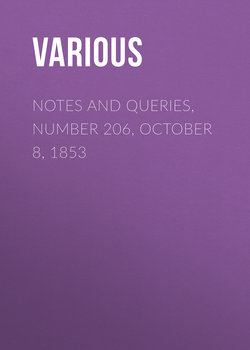Читать книгу Notes and Queries, Number 206, October 8, 1853 - Various - Страница 8
Queries
ОглавлениеDESCENDANTS OF MILTON
It is well known that the issue of the poet became extinct in 1754, unless they survived in the descendants of Caleb Clarke, the only son of Milton's third daughter, Deborah. Caleb Clarke went out to Madras, and was parish clerk at Fort St. George from 1717 to 1719. In addition to a daughter, who died in infancy, he had two sons, Abraham and Isaac; of neither of whom is anything known, except that the former married a person of the same surname as himself; and had a daughter Mary, baptised in 1727. Sir James Mackintosh made some ineffectual attempts to trace them, and came to the conclusion that they had migrated to some other part of India.
I am perhaps catching at a straw: but it is possible there may be something more than a coincidence in the name of Milton Clark, who is spoken of in the fourth chapter of the Key to Uncle Tom's Cabin as brother to Lewis Clark, the original of the character of George Harris. Perhaps some of your transatlantic friends can inform us:
1st. Whether there is, or has been, in use any system of assigning names to slaves, which would account for their bearing the Christian and surname of their owners or other free men, and thus lead to the inference that there has been some free man of the name of Milton Clark.
2nd. Whether there is any family in America of the name of Clark, in which Milton, or even Abraham or Isaac, is known to have been adopted as a Christian name; and, if so, whether there is any tradition in the family of migration from India.
J. F. M.
AN ANXIOUS QUERY FROM THE HYMMALAYAS
I was honoured, a few days ago, with a communication from India, which contains a Query that is out of my power to answer. But being very solicitous to do my best towards affording the desired information, I bethought myself of sending the letter, in extenso, for insertion in your very valuable and exceedingly useful miscellany. I venture to think that you will agree with me, that the interesting nature of the communication entitles it to a place in "N. & Q." As the letter speaks for itself, I shall say no more about it, but proceed to transcribe the greatest part of it at once.
"Landour Academy, May 26th, 1853.
"Rev. M. Margoliouth,
"Sir,—I do not know in what terms to apologise to you for this communication, especially as it may entail trouble on you, which can result in my advantage alone.
"I am a Jew, believing that Jesus is the Messiah; and I trust this will induce you to assist me in my search after some of my relations whom I believe to be in England.
"I wrote to Dr. Adler, Chief Rabbi of the Jews in England, some years ago, but his information was limited to some distant connexions, the Davises, Isaacs, and Lewises, who still professed Judaism. Subsequent inquiries discovered two uncles of mine, Charles Lewes and Mordan Lewes, in London, who informed me that my grandfather, Isaac Levi, was for ten years a clergyman of the Church of England, and had congregation at Lynn, in Norfolk, and that he had published a tract against Judaism. Beyond this I can get no farther information: my uncles are either too poor or unwilling to prosecute their inquiries any farther. Could you ascertain for me whether my grandfather left any family, and if any member is still alive? My object is to discover their existence, and to renew a correspondence which has been interrupted for more than forty years.
"I am the grandson of Isaac Levi, for many years dead, reader of a congregation of Jews in London; my father, Benjamin Levi, is still alive, and is with me. I keep a school at Landour, in the Hymmalayas, in the north-western provinces of India. I have been led to write to you after reading your Pilgrimage to the Land of My Fathers, and seeing in it that you are the author of a work entitled The Jews in Great Britain, which I have not seen, and concluding from this that if any one can obtain information you can.
